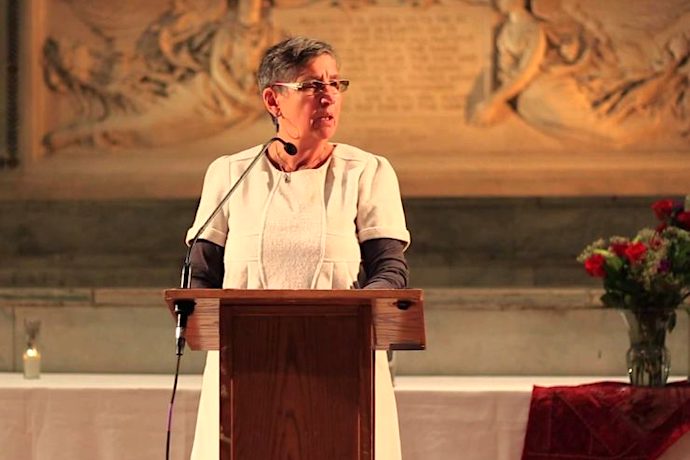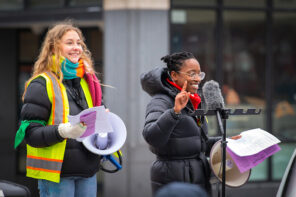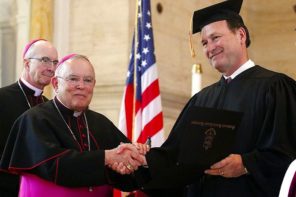While pundits debate whether a U.S. Supreme Court that includes Brett Kavanaugh will overturn Roe v. Wade, a group of progressive clergy isn’t waiting to find out. These religious leaders have been planning for life after Roe for the past year.
They’re drawing on the history of the Clergy Consultation Service on Abortion (CCS), an international network of over 2,000 faith leaders led by mainline Protestants and Reform Jews. Founded in 1967, the clergy fought for the liberalization of abortion laws and helped thousands of women obtain legal and illegal abortions.
Rev. Dr. Donna Schaper participated in CCS while she was a student at the University of Chicago Divinity School. She was arrested for counseling women on how to get from Chicago to New York City to obtain abortions. Half a century later, Schaper is now the Senior Minister at Judson Memorial Church in New York City and still active in the faith-based fight for reproductive justice.
Schaper spoke with RD about the progressive clergy response should the Supreme Court overturn Roe.
This interview has been edited and condensed.
What should clergy be thinking about now as we consider the possibility of Roe overturned and many states re-criminalizing abortion?
Very good question. Obviously, the first answer is nobody knows yet. It’s possible there are some Republicans in the Senate who could jimmy this question for a long time. I think it has been time and many of us, for more than a year now, have been imaging a world post-Roe.
The first thing I want to say is that if men bore children, abortion would be a sacrament. It’s sexism that doesn’t allow a woman to use a perfectly ordinary reproductive technology. I’ve had two abortions and was back to work in the afternoon. That doesn’t mean they were inconsequential to me. They were profoundly positive experiences of exercising my humanity and my freedom.
The second thing I want to get on the table is that President Trump has an interesting sex life, to put it mildly. He seems to enjoy multiple partners. I hope that if there are any paternities involved, that he and other men like him who enjoy multiple partners, that post-Roe, we track our reproductive behavior so that it’s not just women who get stuck with these children and the shame of having borne them. Men should learn to either be ashamed or take some responsibility.
This whole notion that women have babies on their own is bullshit. It’s a higher bullshit. In the name of restricting government power, Trump is actually increasing government power but only over women’s sexuality. This has to be one of the most absurd or Orwellian ideas of the whole thing. It’s one contradiction on top of another contradiction on top of a moral contradiction which will make women suffer.
So where do we go from here? It’s almost like the Do-It-Yourself movement. We’re going to have to encourage birth control because unwanted pregnancies will have no solution for many people in many states.
The thing most of us have been talking about is to encourage the use of medical technology, the morning after pills and very good new drugs. We need to get some wise pharmaceutical company to make money off distributing them so people don’t need abortions, and/or smuggling the drugs in from Mexico and Canada.
There are already very interesting groups of women my age feeling we could take the risk of loading up our vans to take road trips and give them out at churches. We’d see what kind of legal trouble one could get into because the drugs would be given away and are legal in Mexico and Canada.
This kind of civil action, I don’t even know if it’s civil disobedience—would be like the old Jane Collective. This would be Jane with drugs as opposed to Jane with forceps.
As you think through these ideas, how much are you drawing on CCS and Judson’s role pre-Roe?
I was involved in CCS as a seminary intern in Chicago. I got arrested for counseling women about how to get on an airplane to New York to have a legal abortion. We don’t know why we were busted in the University of Chicago Divinity School Chapel basement.
The whole idea of CCS was to remove the stigma of having an abortion and to bless it with the moral agency it deserves. We wanted to change the story from “you’re a bad girl” to “maybe you’re a good girl” if you control your reproductive capacity. That’s what we have been trying to do and will have to do more because we lost the argument over stigma-free reproductive control. We lost it big. Just look at the President’s election. There are still a lot of people who don’t think women and especially poor women should have reproductive freedom.
How do you change a narrative that says religious people are anti-abortion while some secular groups support reproductive freedom?
I find secular organizations are increasingly interested in the religious, the moral, what I would call the narrative of justice. The embrace of the term “reproductive justice” has been a victory for religious women inside the movement. Keeping it secular has been a mistake.
What [Former Judson Memorial Church Senior Minister and CCS Co-Founder] Howard Moody did that was most important was, when the law changed in New York State so that you could get an abortion, he organized the referrers who were mainly clergy at that point and said to the doctors who wanted to charge $500, he said $350, that’s it. He was able to do an action economically that protected poorer people.
How does the task of pastoral care change for clergy if abortion is re-criminalized in many states?
It’s very hard to say. It’s going to have to be legislated. Before Roe, it was understood that counseling someone to have an abortion was illegal. Many clergy were picked up for it. I have a feeling that civil disobedience may be required, like the baker who won’t bake cakes for same-sex couples. We may have to say, “we will not not provide counseling” using a religious freedom argument.
Will clergy have to counsel women to go to other states?
It will be just like the old days. Which is one of the saddest thoughts I have. I think that’s where we’re headed. I think all of us, in the second year of Trump, are getting over the denial and the WTF’s of it. I think that getting over that will release some excellent organization and that’s all we can do.
For now, I never thought I would be doing so much work of mercy with immigrants. I’m supposed to be creating structural change, right? That’s what people trained by Saul Alinsky do. But we tried that for eight years under Obama, and we couldn’t get an inch towards immigration reform. Terrible, terrible failure. So what are we doing? We’re accompanying immigrants to ICE check-ins. This neighbor-to-neighbor movement has grown ridiculously. It’s the work of mercy and solidarity and resistance as opposed to the work of social change. I think we’re in a period where that same energy is going to be released around the abortion question. For all I know, that will [ultimately] be good for women.





